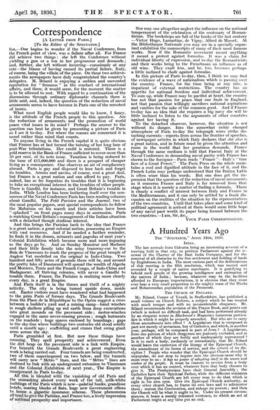A Hundred Years Ago
THE " SPECTATOR," APRIL 24TH, 1830.
INDIA.
The last arrivals from Calcutta bring an interesting account of a meeting held in that city, to petition Parliament against the re- newal of the Charter of the East India Company, and for the removal of all obstacles to the free settlement and holding of lands by Englishmen in India. The most curious part of the deliberations of thili meeting is the fifth resolution, which was moved and seconded by a couple of native merchants. It is gratifying to behold such proofs of the growing intelligence and estimation of the natives of India ; because, whatever may be the facilities afforded to European importations, it is obvious that they must ever bear a very small proportion to the mighty mass of the Hindu and Mohammedan population of the Peninsula.
THE CHURCH OF ENGLAND.
Mr. Riland, Curate of Yoxall, in Staffordshire, has. published a small volume on Church Reform, a subject which he has treated with much temper and with no inconsiderable eloquence. Mr. Riland recommends the revision of the Prayer Book, end points out (which is indeed no difficult task, and had been performed already by an eloquent writer in Blackwood's Magazine) numerous particu- lars in which it might be properly amended. But who are to carry those amendments into effect ? A Legislature that is composed in part not merely of sectarians, but of Catholics, and which, in another year, perhaps, will be composed in part of Jews ? A Legislature, from one portion of which clergymen are jealously excluded, and in another of which they are fee bly and inadequately rekesented ? Is it to such a body, mediately or immediately, that Mr. Riland would leave the correction of the liturgy of the Episcopal Church, the amendment of its forms of service, and the reform of its dis- cipline ? People who wonder that the Episcopal Church should be unpopular, do not stop to inquire into the obvious cause why it must ever be so : it has no power of adapting itself to the wants and wiehea of the people. It must be content to receive from a body over which it has no control, whatever form that body chooses to give it. The Presbyterians have their General Assembly ; the Catholics have their Spiritual Father, drhile the different ministers of the Episcopal Church are left every man to do that which is right in- his own eyes. Give the Episcopal Church authority, as every other church has, to frame its own laws and to 'administer them • restore the Convocation, and enlarge its powers ; and then the diurch will be what it ought to be. Under its present-circum- stances, it bears a merely tolerated existence, to which an act of Parliament might at any time put an end, .




































 Previous page
Previous page